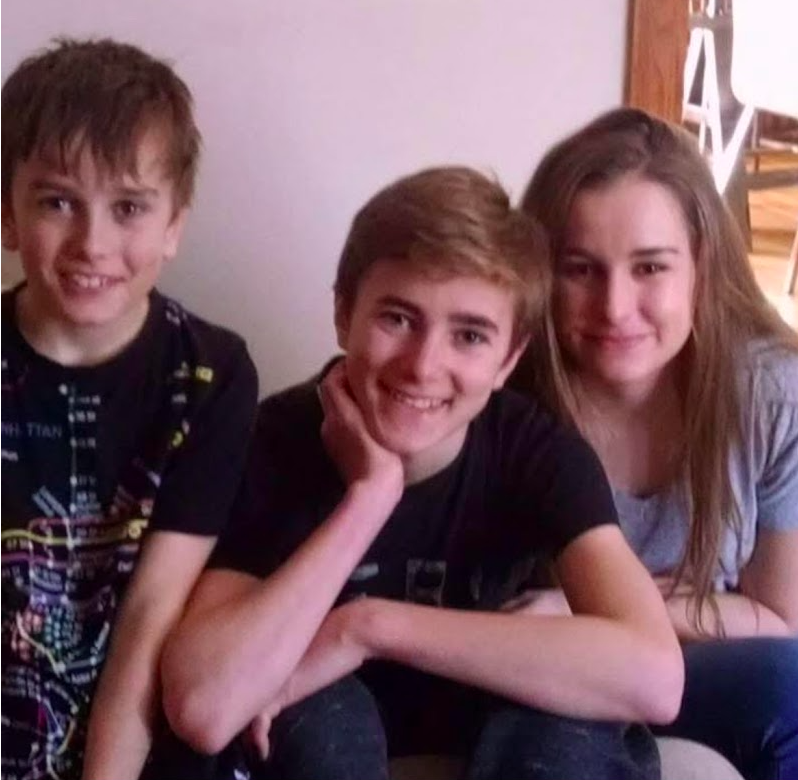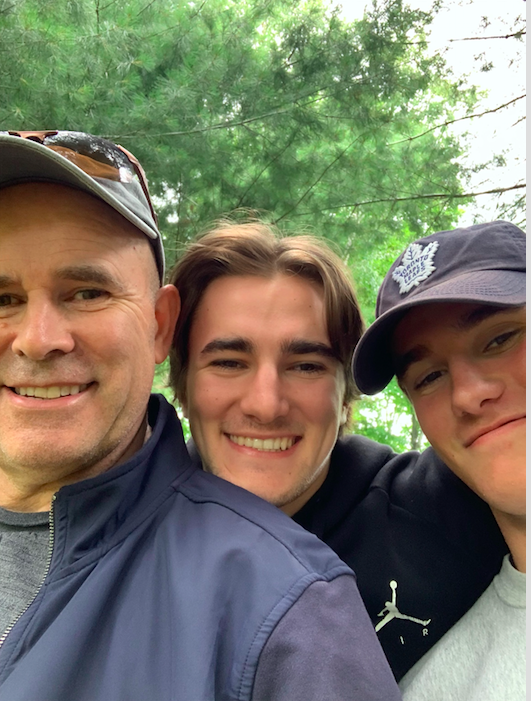So Grief, Anger and Empathy Walk Into a Bar...
After losing his 14-year-old daughter Maddie, a father turned his grief into purpose. Through The Mentor Well, he helps teens and young adults find guidance, empathy, and strength before they reach a breaking point. This story reminds us that grief, anger, and empathy can build hope—and connection saves lives.
If You Feel Your Teen Pulling Away, EQ & Mentorship Helps You Reconnect in a Real and Lasting Way
Many teens struggle to express emotions, and parents often feel unsure how to help. The MentorWell teaches simple emotional intelligence strategies that help teens feel understood, trusted, and supported. This free webinar will show you how to create healthier conversations at home and strengthen your relationship in a calm and practical way.
What We Can Learn From a Team That Wasn’t Supposed to Win
The 2025 Toronto Blue Jays shocked the baseball world by mentoring their way to the World Series. This post explores how belief, trust, and connection transformed a team once counted out into champions in spirit. Learn how mentorship and mindset can create lasting success, on and off the field.
The 10-Second Rule That Could Save a Life
Discover how a 10-second pause can transform how you connect with your teen. In this free MentorWell webinar, you’ll learn emotional intelligence tools that help you stay calm, reduce conflict, and create safety in conversations that matter most. Happening November 13 at 1 PM EST—register now to strengthen communication and trust with your teen.
The 6 Things I Tell Parents When Their Teen Starts to Pull Away
When teens pull away, parents often react with fear instead of connection. In this heartfelt piece, Chris Coulter shares five practical ways to rebuild communication, earn trust, and bring calm back into strained parent–teen relationships. Learn how listening, consistency, love, and mentorship can help families reconnect.
While One Child Battles Mental Health Challenges, Who’s Protecting Their Brother or Sister?
When one child battles mental health issues, siblings often become the “invisible” ones, staying quiet to avoid adding stress. Research shows 43% of these siblings experience psychological challenges themselves. This article explores the emotional impact on silent siblings and how mentorship can support them before crisis develops.
Before Therapy. Before Crisis. There’s Mentorship.
Many parents believe they can mentor their teens, but love and authority make full honesty difficult. Teens need trusted mentors who listen without judgment and teach emotional intelligence. Most schools don’t teach kids how to process grief, anxiety, or self-worth. The MentorWell bridges that gap through empathy, connection, and understanding.
What I Learned Sitting Beside a Parent Who Just Lost Their Child
I met grieving parents in a quiet Starbucks, three months after losing their child. They weren’t looking for answers, just someone who understood. I listened as they shared memories, fears, and questions I couldn’t answer. That night taught me grief needs presence, not solutions. It also shaped The MentorWell, where mentors show up, listen, and walk beside young people who feel lost.
The Lie We Tell Ourselves: “My Kid Would Tell Me if Something Was Wrong.”
Most parents believe their child would tell them if something was wrong. Chris Coulter shares a raw and honest reflection on losing his daughter Maddie and the lessons he wishes every parent understood. This powerful article challenges silence, denial, and fear—urging parents to listen with love, not assumptions.
The One Language Your Child Needs, And It’s Not Taught in School
Parents often invest in languages like French or Mandarin for their kids, but what if the most important language isn’t taught in school? This post explores why Emotional Intelligence is essential for your child’s success, and how The MentorWell mentors teach teens the language of confidence, resilience, and connection.
Maddie Didn’t Need More Advice. She Needed Someone.
Maddie’s story reminds us that teens don’t always need advice — they need someone in their corner. A mentor offers a safe space to be heard, understood, and supported. At The MentorWell, we believe mentorship can ease the weight teens carry and give them hope. Learn why having someone who truly listens matters more than advice.
Why So Many Males Die by Suicide, And What We’re Still Not Talking About
Over 80% of suicide deaths are male. Men are taught to push through pain but not to express it. Grief in men often shows up as anger, isolation, or silence—not tears. At The MentorWell, mentorship provides boys and men with safe spaces to build emotional strength, resilience, and language for their pain. Change starts with one conversation.
Parent Estrangement: Why Adult Kids Are Cutting Off Their Parents?
Emotional estrangement between parents and adult children is rising. Learn why many kids are going no-contact what behaviors push them away and how a caring mentor can step in to help rebuild trust and connection. This post explores root causes like boundary issues past wounds and miscommunication offering hope for healing.
How I Learned to Talk to My Teen (and Sometimes Just Keep My Mouth Shut)
Connecting with teens isn’t about always having the answers—it’s about listening, asking if they want to “feel it or fix it,” and knowing when to bring in mentorship. This post shares my real-life struggles and lessons in communicating with teenagers, and how a mentor can help when words run out or conflicts feel impossible. Advice for parents, mentors, and anyone raising teens.
A Mentor, Therapist, and Coach Walk Into a Bar…
What’s the difference between coaching, therapy, and mentorship? This insightful post breaks down how each approach supports growth in different ways—and why mentorship is uniquely suited for those who feel stuck but not in crisis. If you're seeking clarity, support, or simply someone to walk beside you, start here.
Why “Help Me Understand” Is the Most Underrated Parenting Tool
When teens slam doors or shut down, it’s not always defiance—it’s often fear or overwhelm. “Help me understand” is a powerful phrase that lowers defences and invites connection. This blog explores the science behind teen resistance and how a small shift in language can open space for empathy, trust, and deeper conversations. teen shuts down
how to talk to teenagers
parenting teens communication
teen resistance
help me understand phrase
emotional connection with teens
mentoring teens
teen emotional shutdown
talking to angry teens
support for teen mental health
What If You Had to Be 15 Again, But in 2025?
Teens today are under immense pressure—from social media to self-doubt. Unlike past generations, their mistakes are documented forever. Mentorship gives them a safe, judgment-free space to grow, reflect, and build emotional resilience. It’s not about fixing them—it’s about walking beside them while they find their way. teen mental health support, mentorship for teens, navigating teen years, emotional resilience for teenagers, help for struggling teens, parenting teens, teen social media pressure, teen support system
“Did I Go Too Far?” How to Repair After a Blow-Up with Your Teen
Big fight with your teen? It’s not the conflict that causes damage—it’s the silence that follows. This post offers practical scripts, a repair ritual, and guidance on how mentorship can help when your teen won’t open up to you. Reconnection is possible, even after the hardest moments.
Are You Building Life Around Your Teen, Or Your Teen Around Life?
Are you building life around your teen—or preparing them to meet life as it is? Many parents bend their schedules, energy, and emotions around their child, thinking it's love. But when life doesn’t bend back, teens struggle. Mentorship offers support outside the parent-child dynamic, building resilience and confidence—for both of you.
teen mentorship programs
parenting teens with confidence
how to support your teen’s independence
mentoring vs parenting
help for parents of teens
building emotional resilience in teens
teen mentorship Canada
letting go as a parent
The Most Connected Generation Is Also the Loneliest: Here’s What They Need
Gen Z is the most connected generation—and the loneliest. Digital tools aren’t solving the crisis of belonging. Mentorship is. One caring adult can reduce anxiety, improve resilience, and change a teen’s future. This piece explores why mentorship is the scalable, human-first solution Gen Z actually needs.




















